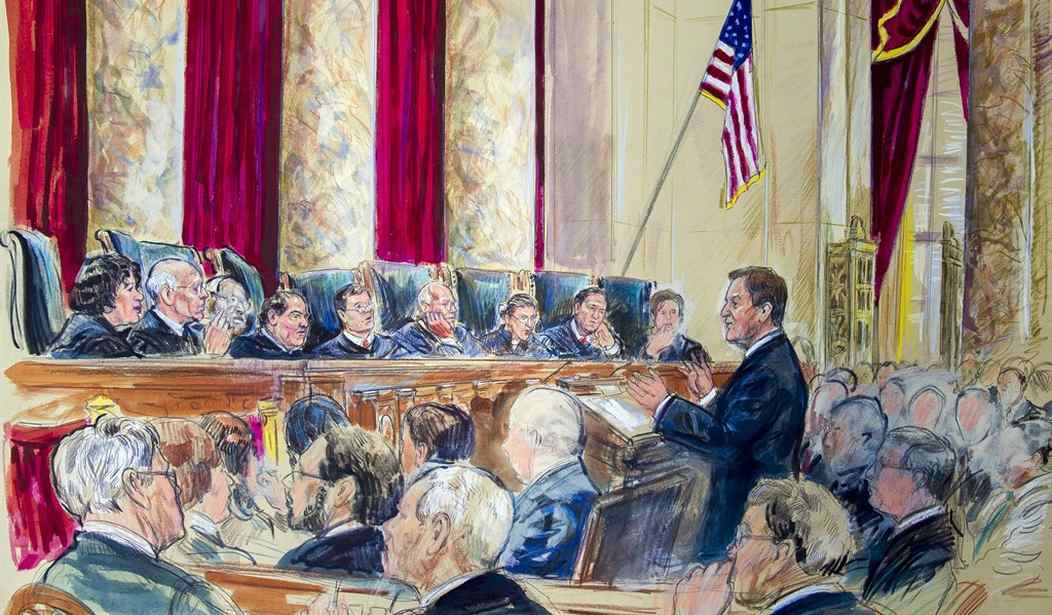To celebrate the recent birthday of the 14th Amendment, let’s play a little end-of-term Supreme Court bingo. Which justice would you pick as author of the following “state’s rights” position?
“Through the structure of its government, and the character of those who exercise government authority, a State defines itself as a sovereign.”
I’ll give you a hint: her name begins with Ruth and ends with Ginsburg.
Yes, it’s true. The same “lawyers,” to use Chief Justice John Roberts’ word, that obliterated the civil rights of millions of Americans in the Obergefell v. Hodges marriage decision, championed, just three days later, ballot initiatives enacted “by the people.” Those justices interpreted the word “legislature” in an Arizona law to confer upon the people the power to remove redistricting authority from their elected representatives and, via direct vote, create their own commission to draw new voting lines.
In both the Arizona and U.S. constitutions, “legislature” is pretty clearly just that – the legislature. But the same justices who in the marriage decision ignored the people picked up the populist torch in Arizona State Legislature v. Arizona Independent Redistricting Commission. Nevermind that they ignored the Election Clause, because, after all, as Ginsburg wrote, “our fundamental instrument of government derives its authority from ‘We the People.’”
You are now entering the Supreme Court spin zone.
“Deference to state lawmaking allows local policies more sensitive to the diverse needs of a heterogeneous society, permits innovation and experimentation, enables greater citizen involvement in democratic processes, and makes government more responsive by putting the States in competition for a mobile citizenry.”
Recommended
Yep. That’s Ginsburg again. It’s amazing how a weekend opened her eyes to the primacy of the people. As Justice Clarence Thomas wrote in his dissent, “One would think the Court is a great defender of direct democracy in the States.”
Because, as we know, on June 26, Americans were bluntly told that is not, in fact, the case. On that day, five justices categorically disenfranchised the voice of the people in 31 states, stretching from California to Virginia, who had, over the last decade and a half, exercised their constitutionally protected right to go to the polls and affirm marriage as a man-woman union.
The most recent state to do so was North Carolina, where, in 2012, 62 percent of Tar Heels – the same number as Ireland’s recent popular vote to redefine marriage – affirmed marriage as a one man, one woman union. In fact, in only three states – Maine, Maryland, and Washington – did the redefinition of marriage happen as a result of the direct vote of the people.
Just seven years ago, the same Arizonans who Justice Ginsburg said have “ultimate sovereignty” went to the ballot box and affirmed marriage as a man-woman union in a state constitutional amendment with a 56-percent vote. It was about the same percentage of this same population that in 2000 voted for the constitutional amendment, Proposition 106, that created the redistricting commission that Ginsburg is defending. To take a phrase from Justice Thomas, it’s “faux federalism” at its finest.
Next term, the Supreme Court will hear Evenwell v. Abbot, a voting case addressing the “one-person, one vote” principle. Undoubtedly, voter ID laws will prove to be a divisive issue in the upcoming GOP primaries and the 2016 presidential election. Remember the chads of Bush v. Gore fame? Clearly, there’s something to all of this.
It’s simple: in America, and to Americans, votes matter. Voting in a free society satisfies one of the most fundamental human cravings – to be heard. And, in our nation – this great republic experiment – votes are the way that those who have been entrusted to run this nation – the people – actually make decisions and exercise their power.
In one sweeping court decision, that authority was rendered illusory, and every American was stripped of the authority to address for themselves the most pressing social issues of the day. The same people celebrating the obliteration of those votes were the same people lauding the voice of the Irish last month. Somehow, those 1.2 million Irish votes were valid, while the tens of millions of votes from their neighbor across the pond were not.
As Justice Thomas noted in the AIRC case, when it came to state marriage amendments, the “cheers for direct democracy were conspicuously absent” as the court struck down the marriage laws passed by the very ballot initiative process that the justices now heralded.
Indeed, Justice Thomas explained that the 5-4 marriage decision reflected “the antithesis of deference to state lawmaking through direct democracy.” In his Obergefell dissent, Justice Antonin Scalia echoed his colleague: “[T]o allow the policy question of same-sex marriage to be considered and resolved by a select, patrician, highly unrepresentative panel of nine is to violate a principle even more fundamental than no taxation without representation: no social transformation without representation.” Perhaps Justice Scalia was recalling his branch’s attempts at cultural change in years past: Buck v. Bell, anyone?
The bottom line is that this isn’t just a “state’s rights” issue; it’s an “every American’s freedom” issue. The Constitution is silent about marriage; it’s clear about voting.
Justice Ginsburg acknowledged the people’s longstanding role in democratically addressing thorny social questions, saying that “[the] Court has long recognized the role of the States as laboratories for devising solutions to difficult legal problems.” What she didn’t mention, however, was that judges can step in and shut down those labs when the results don’t suit their own views.
Once unelected judges remove an authority that lawfully belongs to the people, we are headed down a dangerous path – a path that leads to a regime where the judiciary doesn’t just pick whose voice matters, but ultimately, where no voice matters other than its own.

























Join the conversation as a VIP Member